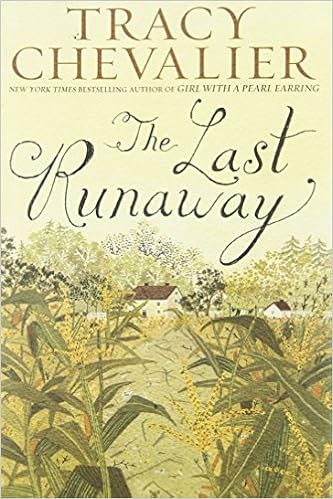2
Stars
 I’ve been
an admirer of Tracy Chevalier’s novels, especially Girl with a Pearl Earring and Remarkable
Creatures, so I looked forward to this novel. Unfortunately, I was
disappointed; this book is not of the caliber I’ve come to expect from this
author.
I’ve been
an admirer of Tracy Chevalier’s novels, especially Girl with a Pearl Earring and Remarkable
Creatures, so I looked forward to this novel. Unfortunately, I was
disappointed; this book is not of the caliber I’ve come to expect from this
author.
The novel
is set in the 1850s in Ohio. Honor Bright, a Quaker, leaves England after being
jilted and finds herself in Ohio where she struggles to adapt to a new life.
She becomes involved in the Underground Railroad despite the objections of her
husband and his family.
One of the
weaknesses is the character of Honor Bright. She tries to be an honourable
person but she is not very bright. She is rather dull and bland and judgmental.
This last failing she does acknowledge: “Perhaps, Honor thought one day, it is
not that Americans are so wedded to individual expression, but that we British
are too judgmental” (258). She spends a great deal of time being critical of
rocking chairs and American quilting but devotes very little time to getting to
know the man she agrees to marry. She knows “She could not go back” (1) but
makes little effort to adjust to life in America; she has to be admonished by
the two women she most admires to keep “an open mind” (292).
Most of the
characters are one-dimensional. Donovan, the slave hunter, has the potential to
be an interesting character, but he ends up being unbelievable. A runaway
refers specifically to him at one point: “’Them slave hunters got a sense makes
‘em good at guessin’ where a runaway is. Otherwise they be out of a job. He’ll
turn up again tonight – I can guarantee it’” (251). Nonetheless, he is
constantly outwitted by his own sister even though he knows she assists
runaways and he frequently watches her home.
There is
some attempt to use literary devices, but they come across as heavy-handed. For
example, after her first sexual experience, which takes place in a cornfield,
Honor wonders “if there were snakes nearby; nothing was moving but it was only
a matter of time before one appeared” (126). Then her marriage quilt is made
for her by women with varying degrees of skill so she begins her married life
“under a quilt of dubious quality. It was not an auspicious start” (132). This
foreshadowing of problems in the marriage is anything but subtle. One technique
I did like is the use of English versus American quilting styles as parallels
to Honor’s difficulties in her new country: Honor’s English quilting style is
unappreciated by the women in her new community and she is dismissive of
American quilting.
I looked
forward to learning more about Quakers, but the information is sketchy. They
are pacifists; they will not lie; they will shun members of their community who
marry outside their faith; they dress modestly; they use “thee” in
conversation; they believe in the equality of all humans. All of this I knew.
The only new thing I learned about the Religious Society of Friends is their
attitude to pre-marital sex; perhaps I shouldn’t be skeptical of the research
of an author known for her historical fiction, but I intend to do some research
to determine if what Chevalier suggests is true.
I did
appreciate one of the major themes explored in the novel: the difference
between principles/religious beliefs and the practice of those
principles/beliefs: “When an abstract principle became entangled in daily life,
it lost its clarity and became compromised and weakened. Honor did not
understand how this could happen, and yet it had: [the family into which she
marries] had demonstrated how easy it was to justify stepping back from
principles and doing nothing” (227). Quakers believe in the equality of all,
but in the religious community to which Honor belongs, not all practice their
belief; some choose not to help the slaves fleeing north.
This may
seem a minor complaint to many, but I was very annoyed with the punctuation.
Commas are left out when they are needed – “The day after Comfort was born
Belle had sent word to the Haymakers” and put in where not needed – “Honor got
that feeling she had when she was sewing together patchwork pieces, and saw
that they fit” (259). These problems indicate poor editing.
At one
point Honor says, “’. . . I do not feel settled. It is as if – as if I am
floating above the ground, with my feet not touching’” (290). This is the
feeling I had while reading this book. I was not engaged by the characters or
the plot. Interestingly, I recently read The
Purchase by Linda Spalding, another recent book about the Quakers and
slavery. It too was unsatisfactory.
No comments:
Post a Comment